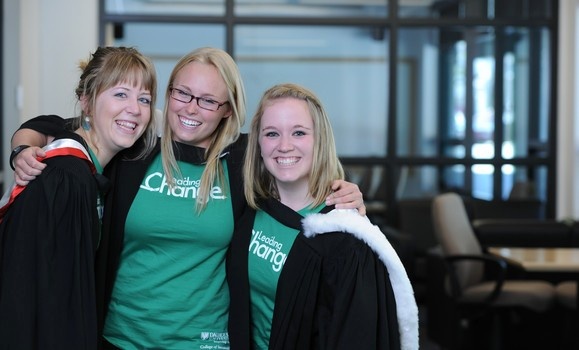Despite growing up in the landlocked city of Winnipeg, named after the Cree word for ŌĆ£muddy water,ŌĆØ Chelsea Boaler has been fascinated by the ocean for as long as she can remember.
When she had the chance to come to Dalhousie, and to combine a Marine Biology degree with DalŌĆÖs new Environment, Sustainability and Society (ESS) program, she says it felt like ŌĆ£home.ŌĆØ
ŌĆ£ThatŌĆÖs not an uncommon reaction,ŌĆØ says Steve Mannell, director of DalŌĆÖs College of Sustainability. ŌĆ£We have a lot of students and faculty who say the program is challenging, inspiring, but also approachable. Students and professors learn with and from each other in ways that are equal instead of hierarchical. The students love the subjects theyŌĆÖre studying and the perspectives they get from the mix of students and professors, but they also feel like their professors are learning from them as well. ItŌĆÖs not just a top-down model.ŌĆØ
Interactive learning
Housed in DalhousieŌĆÖs greenest building on campus, the Mona Campbell building, the College of SustainabilityŌĆÖs ESS program launched in September 2009 and has doubled in size since. Ms. Boaler will be one of the first students to graduate with a double major or combined honours degree in ESS and a second discipline of their choice ŌĆö anything from biology and business to theatre or journalism.
Unique within the country, and similar to only a handful of sustainability programs worldwide, ESS offers a double major structure, interdisciplinary teaching teams with cross-appointed professors, and problem-based experiential and community learning. It shares company with the likes of Harvard University and the University of Tokyo as one of only eight members of the International Network of Programs in Sustainability. ItŌĆÖs also been named one of the ŌĆ£WorldŌĆÖs Top 25 Good Practices in Education for Sustainable DevelopmentŌĆØ by UNESCO and was nominated for the Innovative Educational Practice Award at the first World Innovation Summit on Education in Doha.
The interactive, experiential learning ESS offers is exactly the kind of learning that Cheryl Robinson, one of Ms. BoalerŌĆÖs classmate and friends, is excited about. Born in Calgary, but raised in Malaysia, Ms. Robinson says the program changed the way she thinks. It let her experience first-hand the complexities of collaborating with multiple stakeholders, each intensely passionate about their (sometimes conflicting) points of view.
ŌĆ£We were tasked with updating the UN Convention on Biological Diversity,ŌĆØ says Ms. Robinson. ŌĆ£Eighty of us had to choose either a country or organization to represent and I was the WTO, an organization I otherwise wouldnŌĆÖt be aligned with. We had to research what our stakeholderŌĆÖs interests were, create and collaborate with alliances and actually change the content of the treaty. It was awesome. Without the simulation I never would have understood how much work goes into it and the challenges people face. Now I totally get why they canŌĆÖt just ŌĆśget it done.ŌĆÖŌĆØ
Ready to take on the world's challenges
The sustainability challenge is complex and diverse and requires new knowledge and models of problem solving, creative thinking and leadership. To help students become the agents of change ESS aims to produce, it offers courses on sustainability and society, problem-based learning and governance and global approaches to environmental decision-making. It harnesses the intellectual strength of professors and students in Dalhousie's 11 faculties and encourages discussion and debate among like-minded individuals with diverse backgrounds and perspectives.
While there are no simple solutions, at its root ESS encourages students to protect the natural environment and to create the kinds of jobs a green economy will need.
Graduate Emma Norton says that rather than look abroad, there is a lot of work that can be done locally. Inspired by a project on Boat Harbour, Pictou, N.S., Ms. Norton says groups were all given the same assignment yet had different outcomes and perspectives. From where she sits, sustainability is not just about climate change, but about human relationships. She stresses the social aspect and says that if we can grow to care about each other, taking care of the world around us will naturally extend from that.
And that is exactly that kind of thinking that Prof. Mannell says will help the world move forward in a positive direction, one that, as the Great Law of the Iroquois states, considers seven generations ahead and has in view, ŌĆ£not only the present but also the coming generations, even those whose faces are yet beneath the surface of the ground ŌĆō the unborn of the future Nation.ŌĆØ

